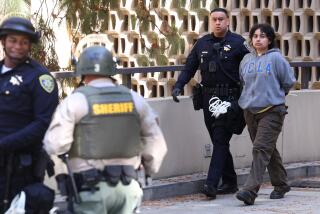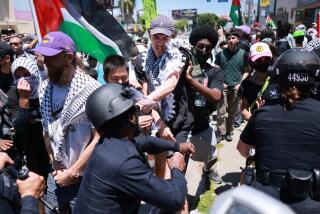80 Arrested as AIDS Protest Is Broken Up
Hundreds of AIDS activists swarmed outside the Federal Building in Westwood Friday morning, blocking entrances and shouting slogans during a massive protest against federal AIDS policies that ended in 80 arrests.
In one of the largest AIDS demonstrations ever in Los Angeles, nearly 400 protesters from Los Angeles, Long Beach and Orange County surrounded the building about 6:30 a.m., demanding that the government relax restrictions on the use of experimental drugs by those with acquired immune deficiency syndrome.
The protest was peaceful for the most part, but some activists charged that officers used excessive force during the arrests and refused medication to protesters who became ill.
Federal officials denied the charges.
Spokesmen for the demonstration--which was sponsored by the Los Angeles and Long Beach chapters of the AIDS Coalition to Unleash Power (ACT UP) and the Orange County Visibility League--said it was one of several held in major U.S. cities, including San Francisco, Dallas and Boston.
“Our goal (in Los Angeles) is that the Federal Building not conduct business as usual,” said activist Steven Gould, a spokesman for ACT UP Los Angeles, during the protest. “We don’t want the government to continue to be complacent. We want to shut this building down.”
Less than two hours after the demonstration began, officers from Federal Protective Services--all wearing riot gear, surgical masks and rubber gloves--took 80 activists into custody.
So many people were arrested that officers ran out of disposable plastic handcuffs and resorted to duct tape to bind the protesters’ wrists.
One demonstrator, the Rev. Troy Perry, a pastor of the Metropolitan Community Church, suffered minor shoulder injuries when he was arrested, said Federal Protective Services chief Mike Anderson. He said two federal officers suffered minor bruises and scrapes.
Anderson, who was at the building with other officers at 6 a.m., said most of the arrests were for trespassing and obstructing federal workers. Seven were taken into custody for resisting arrest, he said. They were all cited and released a few hours later after posting $25 bail.
Peter H. Sigal, a 25-year-old UCLA graduate student, was arrested for assault after he spit on an officer. He was arraigned later Friday in federal court on the assault charge and was released on a $5,000 bond.
Assistant U.S. Atty. Patricia Beaman said she would seek a search warrant to obtain a blood sample from Sigal to determine if he has the AIDS virus.
After the protesters were released, spokesmen made the allegation of excessive use of force.
Attorney Christopher Fairchild, a lawyer for ACT UP Los Angeles, called the officers’ behavior “excessively brutal and unnecessarily violent.”
Mike Larson, a spokesman for the General Services Administration, which oversees the activities of the Federal Protective Services, said federal officers followed standard procedure.
“I have no knowledge of any of those incidents (of brutality) occurring,” said Larson.
After the arrests, the building was opened for business.
For much of the protest, the officers waited inside the building while demonstrators marched, beat drums, picketed, blew whistles and chanted such slogans as “60,000 dead from AIDS. Where was George?” in reference to President Bush.
The demonstrators listed four demands: the immediate release of AIDS drugs to the public; an emergency federal program to combat the lethal disease; an end to job and insurance discrimination against those infected with the human immunodeficiency virus (HIV), which causes AIDS, and quality health care for everyone.
Experimental Drugs Sought
Activists said drugs that had already been proven nontoxic should be released to the public, even though testing for other potential side effects might be incomplete.
“I’m taking AZT now,” said one activist with AIDS-related complex who identified himself only as Brian. “I would rather have an experimental drug than one that I know is not doing any good or could be doing harm.”
Federal health officials already have moved to address some of the concerns of those who believe the government is moving too slowly.
Last week, the health officials formally approved DDI, or dideoxyinosine, for widespread use as a “treatment IND,” or investigational new drug. The designation permits the drug to be used as a treatment while research continues and before it has been approved for marketing.
Concern on Side Effects
But federal researchers have expressed concern over the drug’s “potentially serious side effects.” Early results suggested DDI could be tolerated by most AIDS patients, but recent studies indicate that higher doses can trigger significant side effects, including painful nerve damage to the feet and damage to the pancreas.
Shortly after the demonstration started, employees started arriving for work. As they tried to enter the building, they were blocked by AIDS activists who locked arms and stood or sat in front of the doors.
One woman, an employee who got into a shouting match with some protesters, said she was shoved away from the entrances.
‘I Was Pushed’
“I tried to go through three doors and I was blocked,” said the woman, who declined to identify herself. “I was pushed back by those people.”
Most of the other workers simply stood by and watched the demonstration--and some seethed.
“We’re angry,” said another woman, who also declined to give her name. “It’s keeping us from doing our jobs. I work for the Veteran’s Administration, and we treat people with AIDS. The VA doesn’t have anything to do with this, so why can’t we go to work?”
Moments later, the federal officers began making arrests.
Even as protesters were dragged through the doors, handcuffed and taken into a holding cell in the basement, they said they would continue to attack federal AIDS policies.
‘I’m a Little Afraid’
“I’m about to get arrested, and I’m a little afraid,” said psychologist Martin McCombs as officers dragged away a man squatting next to him. “But I’m willing to get arrested because I’m more afraid of doing nothing.”
Just before he was arrested, Perry said much of the apathy that exists about AIDS springs from such misconceptions as “only homosexuals contract the disease and it’s a punishment from God.”
“I don’t believe in a theology of disease,” said Perry. “This is no more God’s punishment of homosexuals than sickle cell is punishment for black people.”
And in the end, demonstrators conceded that they had little impact on the employees.
“I’m telling people I’m dying,” said Brian. “And I’m asking them to help me and I feel like I’m talking to people who were never alive in the first place.”
Times staff writer Hector Tobar contributed to this story.
More to Read
Sign up for Essential California
The most important California stories and recommendations in your inbox every morning.
You may occasionally receive promotional content from the Los Angeles Times.










